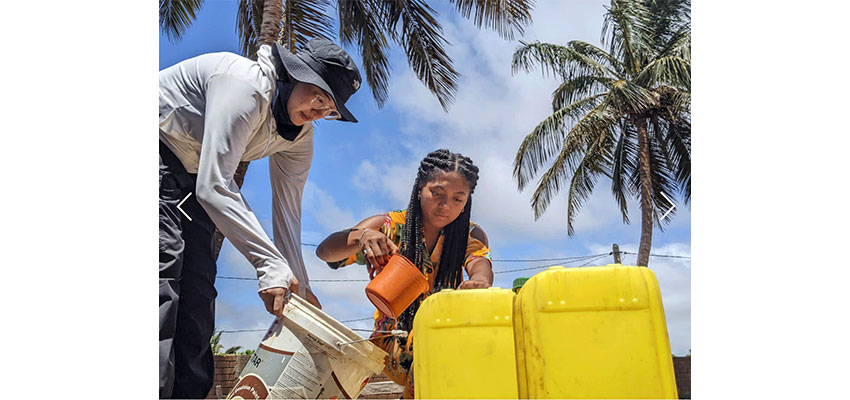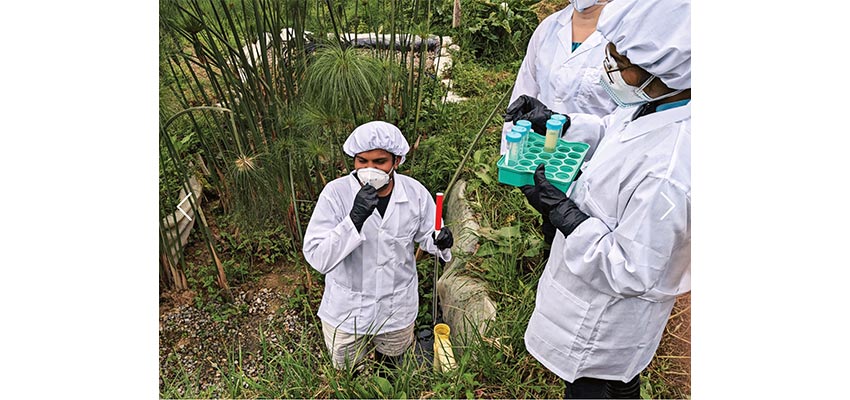
Students innovate to help solve challenges in communities worldwide
This past January, in the small, small town of Ambovombe in southern Madagascar—a place accessible by the bumpiest of roads—Lilly Heilshorn ’25 learned something she’ll never forget: what gets engineered in the controlled comforts of a lab may not work once it’s dropped into the real world for a test drive.
You might say it’s a central lesson of MIT D-Lab, which works with people around the world to develop and advance collaborative approaches and practical solutions to global poverty challenges. Founded in 2002, D-Lab is now part of the MIT Morningside Academy for Design, an Institute hub for cross-disciplinary education, research, and innovation formed in 2022.
In Madagascar, the majority of the population struggles with accessing clean water. Tatirano, a local organization that empowers Malagasy women and works on water access, has responded in part by developing the beginnings of a solar-driven desalination system. They reached out to D-Lab for assistance in designing and building a condensing chamber for the desalinator to collect the clean water.
That’s how Heilshorn and six classmates from MIT and Wellesley found themselves last fall in a course called D-Lab: Development, creating two prototypes of the chamber, an iterative process that involved weekly meetings with Tatirano and others. “I love the way the class was set up,” says Heilshorn, “in that we were presented with this challenge to solve.” She found that the best way to work through that challenge was to communicate with her teammates both in Cambridge and half a world away. “This class really emphasizes creating technology that matters to real people,” she says. Otherwise, “it will not last as a long-term solution.”

The condensing chamber prototypes weren’t something that Heilshorn and her fellow students could simply bring aboard the plane, which meant they needed to transmit their design specs to a group of Malagasy students ahead of time to build onsite. During Independent Activities Period, the student team traveled from Boston to Ambovombe to see Tatirano’s model for collecting rainwater and empowering local women firsthand. It’s also when Heilshorn and her classmates realized their prototypes weren’t working.
Heilshorn says connecting with real people and real problems taught her the value of weaving a central question into her engineering projects going forward: “What can I do to ensure that the work that we’re doing will be meaningful when we go to the place it’s intended for?” She also came to recognize the importance of talking with local partners when collaborating. “It just feels a lot more tangible,” she says. “Engineering exists with a context. Within a place.”
“What can I do to ensure that the work that we’re doing will be meaningful when we go to the place it’s intended for?” says Lilly Heilshorn.
But beyond observing whether the prototypes worked or not, Heilshorn stresses the importance of “getting to experience a new culture and use that to inform future projects.” She loved connecting with Malagasy students her own age who taught her that water access is fundamental to every aspect of life.
“It gets you out of your seat”
The D-Lab curriculum, which consists of a dozen or so class offerings per year, isn’t meant only for those who want to pursue a career in international development. Rather, “students are coming from every major, and we really are providing them with tools to think about interdisciplinary complex problems,” says Libby Hsu MNG ’10, SM ’11, D-Lab’s associate director of academics.
One such problem that students wrestle with in the introductory course is: What does poverty look like around the world today, what historical forces shaped our modern economic and social reality to distribute wealth unequally, and what might we do about it? Sometimes, the students are tasked with developing responses to particular fallouts of climate change. “We really want students to be exposed to these global ideas,” Hsu says, “and the diverse ways that people are thinking about those problems around the world.”
No matter what trajectory a student takes after graduating from MIT, Hsu says the intention is that “they’ll use those problem-solving skills they acquired at D-Lab in their personal and professional lives in the future.” Most of the classes contain an overseas travel component. Because these projects can’t be completed within a single semester, international partners often work with successive cohorts of students over many years. Heilshorn found the D-Lab curriculum refreshing. “It gets you out of your seat,” she says. “It gets you out of your iPad and your notebook. You meet with your teammates one day. Then you prototype things. Then you test them and share your results.”

Graduate students can sign up for D-Lab classes too. Neil Patel MAP ’23, for example, took a year out of his career implementing projects for the United States Agency for International Development to pursue a master’s in the Data, Economics, and Design of Policy program at MIT. His background is in economics and data science, so he was excited to try a hands-on experience with D-Lab that allowed him to work with environmental, mechanical, and civil engineers. Patel and his team helped a group in Colombia to develop a wastewater treatment system that mimicked an artificial wetland, using a layer of worms to compost the fecal sludge before filtering it through multiple layers of gravel and sand.
Patel has noticed that those in the humanitarian field sometimes develop solutions before properly understanding the problems and needs of a community. D-Lab taught him the importance of co-creation and human-centered design. “An idea is only as valuable as the people who ultimately use it,” he says. “We were working with our Colombian counterparts collaboratively to see how our collective strengths could come up with the best possible solution.”
As for Lilly Heilshorn, she credits D-Lab with helping her find her niche and a sense of direction. “I found the intersection of my academic, community service, and travel interests,” she says proudly, “and I’ve found something that I can see myself doing in the future.”
Give now: Support MIT D-Lab
More information
Contact
Libby Hsu, MIT D-Lab Associate Director of Academics

